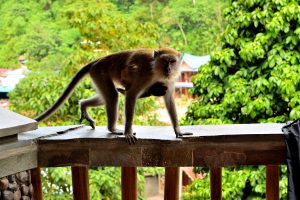Yesterday brought the news that U.S. federal prosecutors have charged eight people, including two Cambodian government officials, with running an international monkey-smuggling operation that saw hundreds of endangered macaques being poached from the wild in Southeast Asia and shipped to the United States.
In a statement, the U.S. Attorney’s Office for the Southern District of Florida said that Masphal Kry, 46, the deputy director of wildlife and biodiversity at Cambodia’s Forestry Administration, was arrested on Wednesday at John F. Kennedy International Airport in New York.
This led to the unsealing of an indictment against an alleged wild monkey smuggling ring involving eight suspects. These included Omaliss Keo, 58, the director of Cambodia’s Forestry Administration, and six members of a “major primate supply organization” based in Hong Kong and Cambodia. These six others were James Man Sang Lau, 64, of Hong Kong; Dickson Lau, 29, of Hong Kong; Sunny Chan, of Hong Kong; Raphael Cheung Man, 71, of Cambodia; Sarah Yeung, of Cambodia; and Hing Ip Chung, 61, of Cambodia.
The eight were each charged with one count of conspiracy and seven counts of smuggling. If convicted, they face up to five years in prison on the conspiracy charge and up to 20 years imprisonment on each of the smuggling charges.
Together, the co-conspirators are alleged to have captured wild long-tailed macaques in national parks and protected areas in Cambodia and laundered them through the Ministry of Agriculture, Forestry, and Fisheries (MAFF) and the local office of the Convention on International Trade in Endangered Species of Wild Fauna and Flora (CITES), a key wildlife protection treaty. Equipped with bogus CITES paperwork, the monkeys were then exported to the U.S., falsely labeled as captive bred. “A collection quota of 3,000 ‘unofficial’ monkeys was allowed for which MAFF officials received cash payments,’ the statement alleges.
“Wild populations of long-tailed macaques, as well as the health and well-being of the American public, are put at risk when these animals are removed from their natural habitat and illegally sold in the United States and elsewhere,” Edward Grace, the director of the U.S. Fish and Wildlife Service Office of Law Enforcement, said in the statement.
A key role in this scheme, the U.S. statement alleges, was played by Vanny Resources Holdings, a Hong Kong-based company that breeds monkeys for research. Led by James and Dickson Lau, the firm “conspired with black market collectors and corrupt officials in Cambodia” to acquire macaques and export them to the U.S. and other destinations. In particular, the indictment alleges that between December 2017 and September of this year, Masphal Kry helped bring captured wild macaques to Vanny Resources Holdings, sometimes in person.
The indictment reveals a shockingly brazen use of Cambodia’s institutions of conservation to facilitate the trafficking of an endangered species but is sadly unsurprising given the track record of the Forestry Administration.
The administration was established under MAFF in 2003 to enforce a new Forestry Law that the government reluctantly passed the year prior, following a decade of pressure from foreign donor governments for Cambodia to crack down on illegal logging operations.
In 2007, the London-based watchdog Global Witness published a report alleging that shortly after its establishment, the FA’s then director Ty Sokhun and Agriculture Minister Chan Sarun “illegally sold” around 500 jobs in the new administration. After paying as much as $30,000 to secure a job, the report claimed, the successful candidates were then required to pay as much as half their income to their superiors.
Unsurprisingly, the only way that such costs could be recouped was through the exploitation of the very resources that these officials were sworn to protect. Indeed, the Global Witness report suggested that this was precisely the intention. The report, which was unsurprisingly banned in Cambodia upon its release, detailed the role that both MAFF and FA played in the operations of the Seng Keang Import Export Co. Ltd., which the watchdog described then as Cambodia’s “most powerful logging syndicate,” with links to figures close to Prime Minister Hun Sen, including his first cousin Dy Chouch.
In 2010, in response to bad publicity about logging, Hun Sen fired Ty Sokhun from his position as FA head, shifting him to another position in MAFF. But he was never punished in any way for helping facilitate illegal logging.
The operations detailed in the Global Witness report are characteristic of how power operates in contemporary Cambodia, in which chains of personal patron-client relationships connect the grassroots to the halls of power, by-passing or overwhelming the existing state institutions. In this fluid arrangement, money is passed upward, and protection is extended downward, which is why low-level perpetrators virtually never face accountability inside Cambodia.
All this makes it unlikely that Masphal Kry and Omaliss Keo were operating their monkey smuggling operation in isolation and without the knowledge of their superiors within MAFF. Nor is it likely that profits from the operation weren’t passed on up the chain in time-honored fashion. Exactly how far up the patron-client “tree” the responsibility extends is impossible to say without further evidence, but whatever the truth, it is unlikely that there will be any meaningful accountability on the part of the Cambodian government now that this smuggling operation has come to light.

































